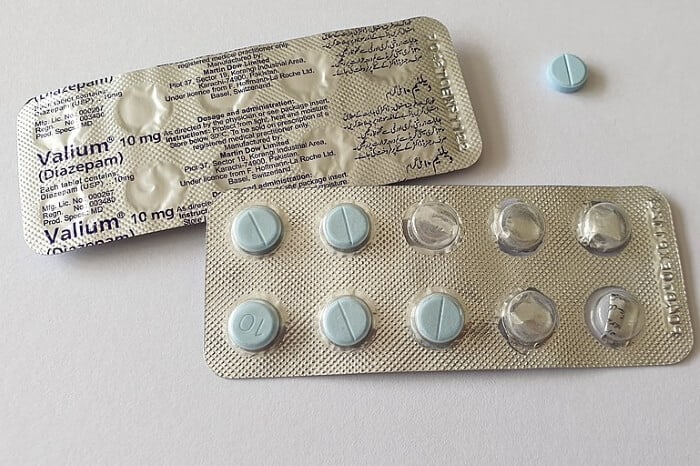If the name of a medication ends with the letters PAM, this indicates two things. Firstly, it had a licence to be manufactured some considerable time ago and secondly, it has a very high degree of dependence with medium to prolonged use.
One of the most common of these medications is Diazepam, which is also marketed as Valium. It is a member of the Benzodiazepine family and is one of the most frequently prescribed medications worldwide since its launch in 1963. It is a psychotropic medication which has an effect on the brain function and basically calms the central nervous system.
Diazepam has generally been prescribed by GP’s for those mostly suffering with anxiety. The dampening of the nervous system reduces anxiety and causes muscles to relax. Benzodiazepines, like alcohol, are depressant drugs. Sometimes referred to as “downers” as they make people feel relaxed and generally “slowed down”

Diazepam withdrawal
In the past, when there was little available history of the drug, people were prescribed Diazepam over long term periods, causing the individuals to develop a prescription drug dependency. It took nearly 20 years for the negative effects of the drug to be medically recognised and for prescription rates to begin to fall. Continued use, in some cases for even a matter of weeks, can lead to a physiological dependence which is an increased tolerance to the drug and can cause severe diazepam withdrawal symptoms when trying to cut down. Tolerance is when a higher daily dose is required to achieve the same effect as our body becomes more used to the drug. Withdrawal from Diazepam can be severe, when the drug is suddenly stopped or drastically reduced. These effects include diazepam panic attacks, insomnia, headaches, nausea, irritability and even seizures from diazepam withdrawal.
Diazepam side effects
There are further potential side effects with Diazepam and the use of it on a long term daily basis. Apart from the body wanting more of the drug to achieve the same effect there can be negative mood swings, hallucinations, trouble walking, decreased energy and constant tiredness.
GP’s have for the last few years been far more aware of the dangerous mid to long term effects of the drug and will now only prescribe for short term use. Unfortunately, Diazepam is also now a well-known drug for its ability to reduce anxiety and since its original patent expired in 1985 it is now manufactured by about 500 companies. It is readily available to purchase from the internet and more and more people have started to self-medicate with no concerns and little knowledge of the dangers of its use. Also, purchasing medication from the internet is very dangerous as you can never be sure of what is in each tablet and purchasing that way is both illegal and unregulated.
Diazepam detox
Diazepam does not have a straightforward detoxification like other drug detoxes as you have to use Diazepam to detox off Diazepam and not use a substitute drug. It can also take considerably longer to detox the body from the medication compared with alcohol or other drugs. At The Haynes Clinic we have our own doctor so that anyone who gets admitted for a Diazepam detox comes under her care and detox protocol. A reducing regime is worked out, for the individual, and a small amount of Diazepam is reduced safely every other day. This avoids any dangers of withdrawal. A Diazepam detox can take up to eight weeks to complete, depending on the amount and longevity of use. This is why it is so very important to be a residential inpatient at the clinic. There is all the clinical and therapeutic support, on hand, to help you each day and night. To try a Diazepam detox at home, reducing the daily dose of medication, is almost impossible. This is because you are introducing the drug into your system and the body will be wanting more. Being at home it is very difficult to stick to that daily reduction. To achieve a successful Diazepam detox there needs to be the safe and supportive environment around you, in order to make it a success. Certainly, there was a time at The Haynes Clinic when people who wanted a Diazepam detox tended to be older and to have been long term prescribed Diazepam by their GP. Now we are seeing younger people who have developed an addiction by buying Diazepam off the street or the internet.
Diazepam and Alcohol
Another serious danger with Diazepam is taking the medication with alcohol. They are both “depressant” drugs and therefore after prolonged combined use can spiral us into depressive, self-harm or even suicidal moods. Everyone is different, and the timeline to get to that stage will vary with each individual. However, that is the time to seek immediate medical help, if not before.
Benefits of Diazepam
Diazepam retains a positive side as a licensed medicine. It is still used to treat anxiety and has anti-convulsant properties – for example, 10mg can be administered by paramedics to stop a seizure or a fit. It also can be used as a detox medication for an alcohol detox (though more frequently chlordiazepoxide is used for this).
Safe, short term use of Diazepam, clearly has a positive benefit when appropriately prescribed. Diazepam is now a controlled drug meaning that there are special laws regarding how it is supplied and prescribed. However, it is a well known drug that can have very clear dependence and prescription drug misuse. It may assist in the short term as a prescribed medication but in the mid to long term it will have a reversed effect on our moods and feelings and with an inability to stop on our own, a residential detox will be required to come off it safely.
